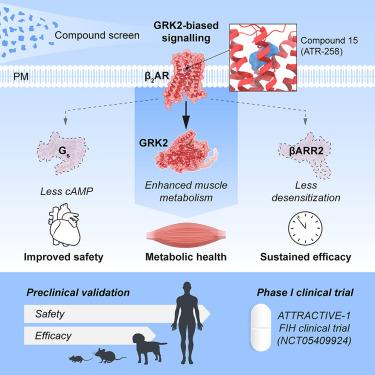grk偏向肾上腺素能激动剂治疗2型糖尿病和肥胖
IF 42.5
1区 生物学
Q1 BIOCHEMISTRY & MOLECULAR BIOLOGY
引用次数: 0
摘要
G蛋白偶联受体(gpcr)的偏向激动作用为更安全的药物提供了潜力。目前的努力已经探索了G蛋白和β-阻滞蛋白之间的平衡;然而,其他传导因子如GPCR激酶(GRKs)仍未得到充分研究。GRK2对于β2肾上腺素能受体(β2AR)介导的葡萄糖摄取至关重要,但由于Gs/环AMP (cAMP)诱导的心脏副作用和β-骤停蛋白依赖性脱敏,β2AR激动剂被认为是血糖管理的不良临床候选药物。利用基于配体的虚拟筛选和化学进化,我们开发了β2AR的通路选择性激动剂,这种激动剂倾向于GRK偶联。这些化合物在高血糖和肥胖的临床前模型中表现良好,与标准β2受体激动剂和肠促胰岛素模拟剂相比,它们对心脏和肌肉的副作用更低。此外,该候选药物在安慰剂对照临床试验中表现出良好的药代动力学和耐受性。因此,grk偏倚的β2AR部分激动剂有望成为治疗2型糖尿病和肥胖的可注射促肠促胰岛素的口服替代品。本文章由计算机程序翻译,如有差异,请以英文原文为准。

GRK-biased adrenergic agonists for the treatment of type 2 diabetes and obesity
Biased agonism of G protein-coupled receptors (GPCRs) offers potential for safer medications. Current efforts have explored the balance between G proteins and β-arrestin; however, other transducers like GPCR kinases (GRKs) remain understudied. GRK2 is essential for β2 adrenergic receptor (β2AR)-mediated glucose uptake, but β2AR agonists are considered poor clinical candidates for glycemic management due to Gs/cyclic AMP (cAMP)-induced cardiac side effects and β-arrestin-dependent desensitization. Using ligand-based virtual screening and chemical evolution, we developed pathway-selective agonists of β2AR that prefer GRK coupling. These compounds perform well in preclinical models of hyperglycemia and obesity and demonstrate a lower potential for cardiac and muscular side effects compared with standard β2-receptor agonists and incretin mimetics, respectively. Furthermore, the lead candidate showed favorable pharmacokinetics and was well tolerated in a placebo-controlled clinical trial. GRK-biased β2AR partial agonists are thus promising oral alternatives to injectable incretin mimetics used in the treatment of type 2 diabetes and obesity.
求助全文
通过发布文献求助,成功后即可免费获取论文全文。
去求助
来源期刊

Cell
生物-生化与分子生物学
CiteScore
110.00
自引率
0.80%
发文量
396
审稿时长
2 months
期刊介绍:
Cells is an international, peer-reviewed, open access journal that focuses on cell biology, molecular biology, and biophysics. It is affiliated with several societies, including the Spanish Society for Biochemistry and Molecular Biology (SEBBM), Nordic Autophagy Society (NAS), Spanish Society of Hematology and Hemotherapy (SEHH), and Society for Regenerative Medicine (Russian Federation) (RPO).
The journal publishes research findings of significant importance in various areas of experimental biology, such as cell biology, molecular biology, neuroscience, immunology, virology, microbiology, cancer, human genetics, systems biology, signaling, and disease mechanisms and therapeutics. The primary criterion for considering papers is whether the results contribute to significant conceptual advances or raise thought-provoking questions and hypotheses related to interesting and important biological inquiries.
In addition to primary research articles presented in four formats, Cells also features review and opinion articles in its "leading edge" section, discussing recent research advancements and topics of interest to its wide readership.
 求助内容:
求助内容: 应助结果提醒方式:
应助结果提醒方式:


